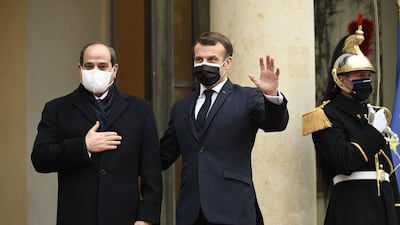US President Donald Trump was able to erase many of the achievements of his domestic and foreign policies from the spotlight last week. Instead he is leaving a shrunken legacy in which he shall be remembered mostly for inciting his supporters to storm the Capitol building in an attempt to overturn the democratic outcome of the recent presidential election.
Future generations will not remember Donald Trump for standing up to China in international trade to serve his domestic interests. They will not remember him for putting a spanner in the wheels of a flawed nuclear deal his predecessor had signed with Iran – a deal that allowed its Islamic Revolutionary Guard Corps to expand militarily in Syria and dominate countries like Iraq and Lebanon. They will not remember him for brokering the launch of unprecedented diplomatic relations between many Arab states and Israel. And they will not remember him for contributing to a reconciliation between Saudi Arabia and Qatar, which could see GCC relations restored.

Rather, future generations will remember Mr Trump for that dark day, when he yielded wisdom to his temper and vindictive tendencies, losing the respect of millions of Americans and much of the world. Mr Trump has given the best parting gift possible to President-elect Joe Biden, not just by rallying a quasi-unanimous American and global chorus insisting he hand over power without further hindrance, but also by prompting even his closest allies to defy him, including Vice President Mike Pence who insisted on discharging his constitutional duties and certifying Mr Biden’s election victory.
Mr Trump may have even rallied senior Republican leaders against him. Last week's developments may yet prove to be a watershed moment for the planned domestic and foreign policies of the incoming administration. In short, the madness that unfolded in the US capital has woken up all sides to the danger of the slippery slope towards American civil strife.
This does not mean that the relationship between the two main parties will suddenly heal, or that Mr Trump’s most earnest supporters will forgive the Republican Party for not siding with them. The President, after all, retains huge influence inside the Republican establishment and has a lot of electoral resources. He is not likely to fade into oblivion. Indeed, he has millions of followers intent on returning him to the White House or, at the very least, disrupting Joe Biden’s ability to govern. All of this may push centrist Republicans and Democrats to work together on a multitude of issues, and to improve accountability and participation in decision-making.
The Democrats will now dominate the the White House, Senate and House of Representatives. Some of them may not want to work with Republicans. But others may prefer to avoid a confrontation and avoid slowing down Biden’s priorities, such as moving to revive the nuclear agreement with Iran and lifting the sanctions.
The recommendations of Mr Biden’s team on the Middle East are not necessarily based on denying the achievements of the Trump administration, but will seek to build on some of its gains, especially with regard to Israel. The objective will be to provide all possible US aid needed by Israel at every juncture, including incentives to Israel to negotiate with the Palestinians and vice versa.
What matters is preserving and expanding what Mr Trump and his son-in-law, Jared Kushner, achieved through the historic Abraham Accords and the start of normalisation between Arab states and Israel. Mr Kushner also played a key role in brokering the Gulf reconciliation, which the Biden team intends to build on and leverage politically, economically, and strategically. One question is, who will be Mr Biden’s Jared Kushner?
The Biden team is already recommending the development and modernisation of US bases in the region, as both China and Russia enhance their military footprint in the Middle East and the Gulf, and Iran continues to pursue nuclear ambitions.
Iran will pose a dilemma for the Biden team's insistence on a two-track policy that starts with soft pressure before resorting to the "hard road" if Tehran does not comply with Washington. There is a recommendation to begin cutting Iran off from the countries it has come to dominate, including Iraq, Lebanon, Syria and Yemen. But how does Mr Biden envisage actually achieving this task? It is not clear yet. It would be impossible to persuade the regime in Iran, especially the IRGC, which in charge of policy in these countries with the full blessing of the Supreme Leader, to adopt this goal.

The tools that the Biden team is thinking of using may include lifting the sanctions, as Iran desperately wants. However, that is unlikely to be enough to make Iran's leadership change its expansionist ideology. For Iran, its regional strategy is motivated by existential reasons. But perhaps the Biden team's anticipated approach, which is to lift the sanctions before threatening to reimpose them, will do the trick. Then again, perhaps not.
Clearly, Mr Biden’s team wants to work closely with European powers, which were antagonised by Mr Trump’s methods and insistence that they pay more contributions into Nato. Today, there is transatlantic eagerness to resume the previous era of co-operation before the Trump era.
Mr Biden’s team wants the President-elect to visit the Middle East before the end of 2021, but only if such a visit would have concrete gains. Mr Biden wants to see serious partnerships and active roles. For this reason, there is talk of appointing a special US envoy to the Middle East with broad powers at the start of the new presidential term.
Raghida Dergham is the founder and executive chairwoman of the Beirut Institute and a columnist for The National























